Hyundai Kona vs Kia Ceed Sportswagon - Differences and prices compared
Costs and Efficiency:
When it comes to price and running costs, the biggest differences usually appear. This is often where you see which car fits your budget better in the long run.
Hyundai Kona has a slight advantage in terms of price – it starts at 23100 £, while the Kia Ceed Sportswagon costs 24300 £. That’s a price difference of around 1277 £.
Fuel consumption also shows a difference: Hyundai Kona manages with 4.60 L and is therefore evident more efficient than the Kia Ceed Sportswagon with 6 L. The difference is about 1.40 L per 100 km.
Engine and Performance:
Power, torque and acceleration are the classic benchmarks for car enthusiasts – and here, some clear differences start to show.
When it comes to engine power, the Hyundai Kona has a evident edge – offering 218 HP compared to 140 HP. That’s roughly 78 HP more horsepower.
In acceleration from 0 to 100 km/h, the Hyundai Kona is noticeable quicker – completing the sprint in 7.80 s, while the Kia Ceed Sportswagon takes 9.70 s. That’s about 1.90 s faster.
In terms of top speed, the Hyundai Kona performs slight better – reaching 210 km/h, while the Kia Ceed Sportswagon tops out at 197 km/h. The difference is around 13 km/h.
There’s also a difference in torque: Hyundai Kona pulls hardly perceptible stronger with 265 Nm compared to 253 Nm. That’s about 12 Nm difference.
Space and Everyday Use:
Whether family car or daily driver – which one offers more room, flexibility and comfort?
Seats: offers more seating capacity – vs .
In curb weight, Kia Ceed Sportswagon is minimal lighter – 1335 kg compared to 1370 kg. The difference is around 35 kg.
In terms of boot space, the Kia Ceed Sportswagon offers evident more room – 625 L compared to 466 L. That’s a difference of about 159 L.
In maximum load capacity, the Kia Ceed Sportswagon performs noticeable better – up to 1694 L, which is about 394 L more than the Hyundai Kona.
When it comes to payload, Hyundai Kona minimal takes the win – 490 kg compared to 485 kg. That’s a difference of about 5 kg.
Who wins the race?
The Hyundai Kona proves to be dominates this comparison and therefore becomes our DriveDuel Champion!
Hyundai Kona is the better all-rounder in this comparison.
 @ Hyundai Motor Company
@ Hyundai Motor Company
Hyundai Kona
Costs and Consumption
View detailed analysis
Engine and Performance
View detailed analysis
Dimensions and Body
View detailed analysis
Hyundai Kona
The Hyundai Kona wears its personality on the outside with bold styling and sprightly handling that turns city driving into something a little more fun than a commute. It blends practical space, modern tech and sensible running costs into a compact, stylish package — a smart pick if you want flair without paying luxury prices.
details @ Hyundai Motor Company
@ Hyundai Motor Company
 @ Hyundai Motor Company
@ Hyundai Motor Company
 @ Hyundai Motor Company
@ Hyundai Motor Company
 @ Hyundai Motor Company
@ Hyundai Motor Company
Kia Ceed Sportswagon
The Kia Ceed Sportswagon is a sensible and surprisingly stylish family wagon that turns daily chores into a bit less of a grind. Practical, comfortable and packed with thoughtful touches where they matter, it’s a smart choice for buyers who want usefulness without sacrificing personality.
details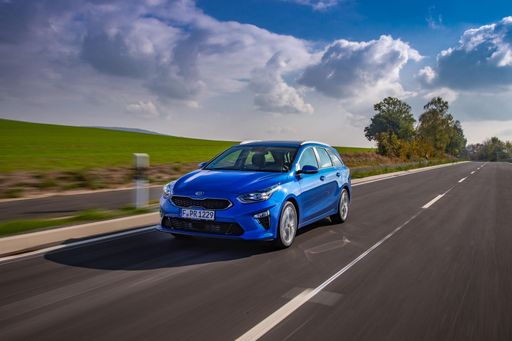 @ Kia Corporation
@ Kia Corporation
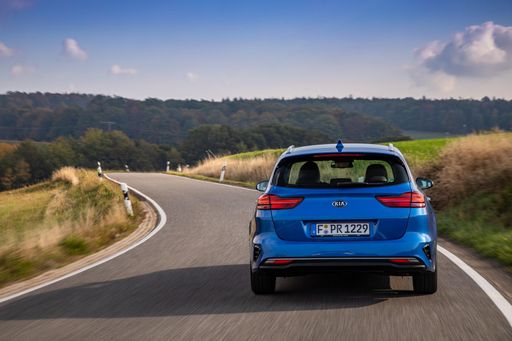 @ Kia Corporation
@ Kia Corporation
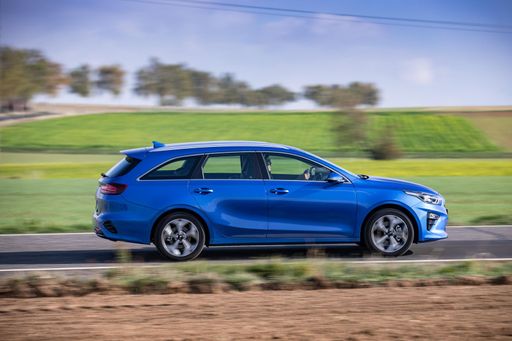 @ Kia Corporation
@ Kia Corporation
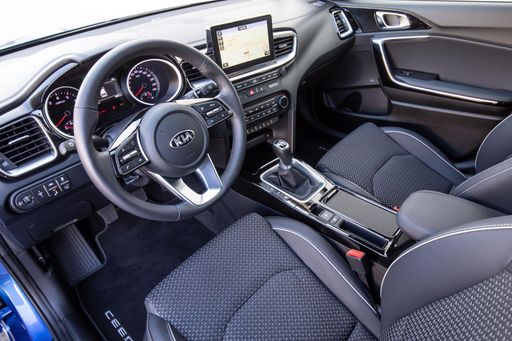 @ Kia Corporation
@ Kia Corporation
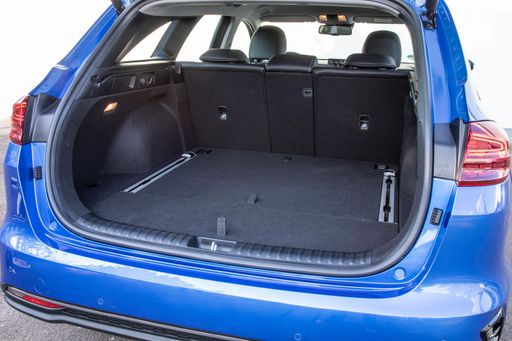 @ Kia Corporation
@ Kia Corporation
 @ Hyundai Motor Company
@ Hyundai Motor Company
|
 @ Kia Corporation
@ Kia Corporation
|
|
|
|
Costs and Consumption |
|
|---|---|
|
Price
23100 - 41600 £
|
Price
24300 - 29100 £
|
|
Consumption L/100km
4.6 - 7 L
|
Consumption L/100km
6 - 6.4 L
|
|
Consumption kWh/100km
14.6 - 16.8 kWh
|
Consumption kWh/100km
-
|
|
Electric Range
377 - 514 km
|
Electric Range
-
|
|
Battery Capacity
1.3 - 65.4 kWh
|
Battery Capacity
-
|
|
co2
0 - 163 g/km
|
co2
137 - 146 g/km
|
|
Fuel tank capacity
38 - 47 L
|
Fuel tank capacity
50 L
|
Dimensions and Body |
|
|---|---|
|
Body Type
SUV
|
Body Type
Estate
|
|
Seats
5
|
Seats
5
|
|
Doors
5
|
Doors
5
|
|
Curb weight
1370 - 1773 kg
|
Curb weight
1335 - 1437 kg
|
|
Trunk capacity
466 L
|
Trunk capacity
512 - 625 L
|
|
Length
4350 - 4385 mm
|
Length
4605 mm
|
|
Width
1825 mm
|
Width
1800 mm
|
|
Height
1580 - 1585 mm
|
Height
1422 - 1465 mm
|
|
Max trunk capacity
1300 L
|
Max trunk capacity
1545 - 1694 L
|
|
Payload
420 - 490 kg
|
Payload
455 - 485 kg
|
Engine and Performance |
|
|---|---|
|
Engine Type
Electric, Petrol, Full Hybrid
|
Engine Type
Petrol, Petrol MHEV
|
|
Transmission
Automatic, Manuel
|
Transmission
Automatic, Manuel
|
|
Transmission Detail
Reduction Gearbox, Manual Gearbox, Dual-Clutch Automatic
|
Transmission Detail
Dual-Clutch Automatic, Manual Gearbox
|
|
Drive Type
Front-Wheel Drive, All-Wheel Drive
|
Drive Type
Front-Wheel Drive
|
|
Power HP
115 - 218 HP
|
Power HP
100 - 140 HP
|
|
Acceleration 0-100km/h
7.8 - 11.9 s
|
Acceleration 0-100km/h
9.7 - 13.5 s
|
|
Max Speed
162 - 210 km/h
|
Max Speed
178 - 197 km/h
|
|
Torque
200 - 265 Nm
|
Torque
172 - 253 Nm
|
|
Number of Cylinders
3 - 4
|
Number of Cylinders
3 - 4
|
|
Power kW
85 - 160 kW
|
Power kW
74 - 103 kW
|
|
Engine capacity
998 - 1598 cm3
|
Engine capacity
998 - 1482 cm3
|
General |
|
|---|---|
|
Model Year
2024 - 2025
|
Model Year
2024
|
|
CO2 Efficiency Class
A, D, C, E, F
|
CO2 Efficiency Class
E
|
|
Brand
Hyundai
|
Brand
Kia
|
Is the Hyundai Kona offered with different drivetrains?
Available configurations include Front-Wheel Drive or All-Wheel Drive.
The prices and data displayed are estimates based on German list prices and may vary by country. This information is not legally binding.
